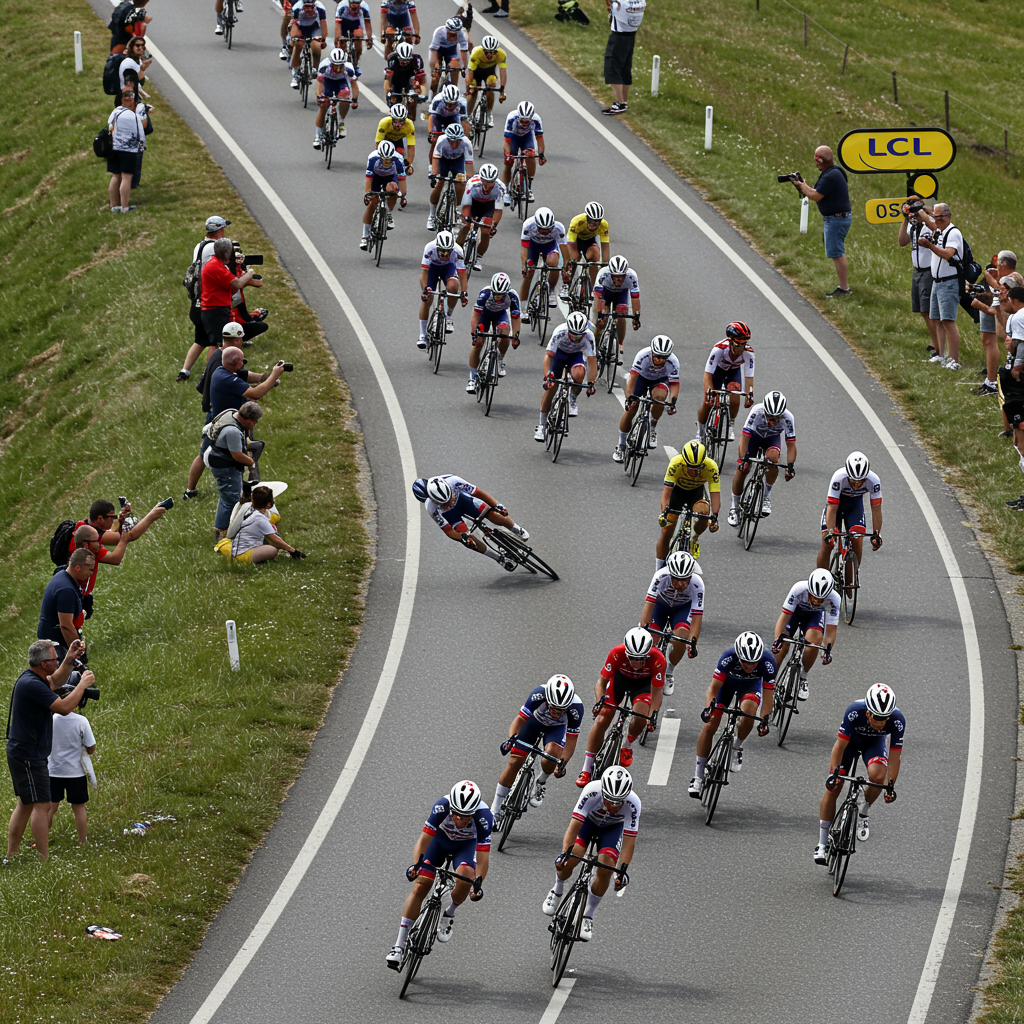Former boxing star Julio César Chávez Jr. has reportedly been arrested by federal immigration officials in Los Angeles. The stunning detention occurred just days after his highly publicized boxing match against Jake Paul. Authorities state Chávez Jr. is now facing deportation proceedings back to Mexico. This development unfolds amid complex allegations surrounding his immigration status, potential links to organized <a href="https://news.quantosei.com/2025/07/04/mexico-confirms-arrest-warrant-for-boxer-julio-cesar-chavez-jr/" title="Breaking: Boxer Chávez Jr. Arrested on cartel Charges”>crime, and pending legal issues on both sides of the border.
Boxing Career Star Arrested by Immigration
Sources indicate that Julio César Chávez Jr., son of legendary Mexican boxer Julio César Chávez Sr., was taken into custody on Wednesday, July 2, 2025. The arrest was carried out by federal agents, including Immigration and Customs Enforcement (ICE) officers, outside a residence in the affluent Studio City neighborhood of Los Angeles. His attorney, Michael Goldstein, described a significant law enforcement presence during the arrest.
Chávez Jr.’s detention came as a surprise to many, particularly given its timing. It happened only four days after he stepped into the ring against social media personality turned boxer Jake Paul in Anaheim, California. Chávez Jr. lost the bout by decision. The Department of Homeland Security (DHS) reportedly decided Chávez Jr. should be arrested on June 27, before the fight, leading to questions about why the action was delayed.
His lawyer vehemently contested the necessity and nature of the arrest. Goldstein called the allegations “outrageous.” He suggested the high-profile detention was a deliberate act “designed to terrorize the community.”
Immigration Status Under Scrutiny
DHS officials provided details regarding the basis for the arrest. They stated Chávez Jr. had overstayed his visa. He reportedly entered the United States legally in August 2023 using a B2 tourist visa. This visa expired in February 2024.
Authorities also claim Chávez Jr. filed an application for permanent residency in April 2024. He reportedly sought lawful permanent resident status based on his marriage to a U.S. citizen, Frida Muñoz. DHS alleges he made “multiple fraudulent statements” on this application. This alleged fraud is a significant factor cited by the government in deeming him removable.
Adding another layer of complexity, Chávez Jr.’s wife has drawn official scrutiny. DHS officials noted that Frida Muñoz was previously in a relationship with Edgar Guzmán Loera. He was a son of infamous Sinaloa cartel leader Joaquin “El Chapo” Guzman. Edgar Guzmán Loera was killed in 2008. While Muñoz has not been charged with any crime, U.S. officials reportedly view her connection as relevant context. Chávez Jr. himself has reportedly claimed friendship with another son of El Chapo, Ovidio Guzmán.
Allegations of Cartel Ties and Mexican Warrant
Beyond immigration violations, U.S. authorities have leveled serious accusations linking Chávez Jr. to organized crime. DHS has explicitly labeled him an “affiliate of the Sinaloa cartel.” This designation contributes to their stance that he is a public safety threat.
Furthermore, U.S. officials state that Chávez Jr. is wanted in Mexico. According to the Department of Homeland Security, an active arrest warrant exists against him in Mexico. This warrant is reportedly tied to his alleged involvement in “organized crime and trafficking firearms, ammunition, and explosives.” Mexico’s Attorney General’s Office confirmed issuing an arrest warrant for a “Julio C” in March 2023. The warrant is specifically for organized crime related to weapons trafficking and manufacturing. Mexican prosecutors confirmed on the day of the U.S. arrest that they had initiated extradition proceedings.
A federal agent, speaking anonymously, confirmed the “Julio C” referenced in the Mexican warrant is indeed Julio César Chávez Jr. However, the agent did not explain why Chávez Jr. had not been apprehended earlier in Mexico despite frequently traveling between the two countries.
U.S. Legal Issues and Prior Flags
Chávez Jr. has a history of legal troubles in the United States. In 2012, he was convicted of drunken driving in Los Angeles. This resulted in a brief jail sentence. More recently, in January 2024, he faced gun charges. Police reports indicated he possessed two AR-style “ghost rifles.”
His attorney, Michael Goldstein, pushed back against official claims that Chávez Jr. had been convicted on the January 2024 gun charges. Goldstein stated Chávez Jr. was granted mental health diversion for these charges. He asserted his client is fully compliant with the program. Goldstein expects these charges to be dismissed soon by statute, emphasizing there is no conviction. Chávez Jr. was reportedly freed on bond under the condition he attend a residential drug treatment facility. The case remains pending, with Chávez Jr. regularly reporting his progress.
Despite facing these issues, Chávez Jr. reportedly continued to travel internationally. U.S. Citizenship and Immigration Services (USCIS) flagged Chávez Jr. to ICE as early as December 2024. USCIS deemed him an “egregious public safety threat” at that time. Yet, according to DHS records, he was allowed back into the U.S. without a visa on January 4, 2025. A DHS system entry under the previous administration had reportedly indicated he was “not an immigration enforcement priority” at that point. Officials later changed this determination on June 27, 2025, officially classifying him as being in the country illegally and removable.
The timing of the arrest and the allegations have fueled speculation. Some in Mexico, like newspaper seller Martín Sandoval Peñaloza, believe the arrest might be politically motivated. Peñaloza suggested President Donald Trump, who had supported Jake Paul in the fight, might be using Chávez Jr.’s case to gain media attention and highlight immigration crackdowns.
Public Reaction and Family Support
The news of the boxer’s arrest by U.S. agents has elicited mixed reactions. Storekeeper Oscar Tienda in Mexico City wasn’t surprised, citing Chávez Jr.’s public struggles. “I think it was predictable because he has had a lifetime of drug use,” Tienda commented.
Chávez Jr.’s family released a statement expressing unwavering support. They voiced “total and unconditional support” for him. The family stated they have “full confidence in his innocence.” They urged that authorities be allowed to conduct their work without “external pressure or speculation.”
The boxer himself had expressed concerns about immigration enforcement before his fight. He told the Los Angeles Times that recent immigration arrests had shaken him and his trainers. “There are a lot of good people, and you’re giving the community an example of violence,” Chávez Jr. reportedly said. He added, “After everything that’s happened, I wouldn’t want to be deported.”
Julio César Chávez Jr.’s career has been marked by significant highs and numerous challenges. He won the WBC middleweight title in 2011 and successfully defended it three times. He shared the ring with prominent fighters like Canelo Álvarez and Sergio Martinez. However, his career has often been overshadowed by struggles with substance abuse, discipline, and legal issues. Despite these troubles, he recently appeared in better shape leading up to the Jake Paul fight. He had claimed to be clean for the match.
The complex web of immigration issues, alleged cartel ties, and legal history in both the U.S. and Mexico creates a challenging situation for the fighter as he faces the prospect of deportation.
Frequently Asked Questions
Why was Julio César Chávez Jr. arrested by ICE?
According to the Department of Homeland Security (DHS), Chávez Jr. was arrested by federal immigration agents primarily for overstaying his B2 tourist visa, which expired in February 2024. DHS also alleges he made multiple fraudulent statements on a permanent residency application he filed in April 2024. Additionally, authorities cite an active arrest warrant in Mexico related to alleged organized crime and weapons trafficking, and classify him as an “affiliate of the Sinaloa cartel” posing a public safety threat.
What is the evidence behind Chávez Jr.’s alleged Sinaloa cartel ties?
U.S. officials from DHS and ICE have labeled Chávez Jr. an “affiliate of the Sinaloa cartel.” This classification is reportedly based, in part, on his marriage to U.S. citizen Frida Muñoz, who was previously in a relationship with a deceased son of cartel leader Joaquin “El Chapo” Guzman. While Muñoz has not been charged, officials view this connection as significant. Chávez Jr. is also reportedly wanted in Mexico on charges directly related to organized crime and weapons trafficking.
What are the next steps for Chávez Jr. after his ICE arrest?
Following his arrest by ICE, Julio César Chávez Jr. is reportedly being processed for expedited removal from the United States. Mexican authorities have confirmed they have initiated extradition proceedings based on their outstanding arrest warrant against him for organized crime and arms trafficking. He also has a pending gun possession case in Los Angeles from January 2024, although his attorney states he is in mental health diversion for that case and expects it to be dismissed.


